How the Rangers takeover ended up in the dock
- Published
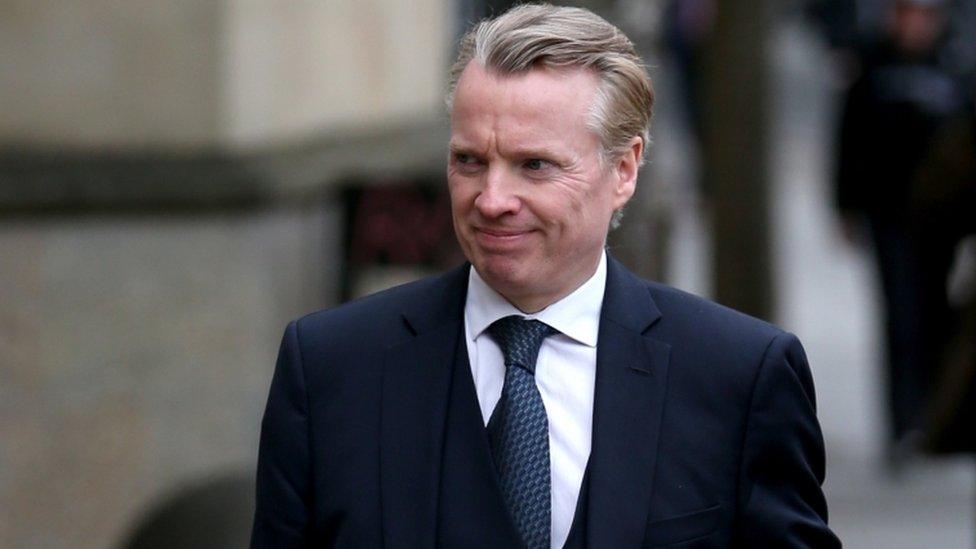
Craig Whyte arrives at the High Court in Glasgow for his fraud trial
Six years after his ill-fated takeover of Rangers, Craig Whyte has been cleared of a multi-million pound fraud which he had been accused of committing when he bought the Glasgow giants.
Whyte had been charged with using the football club's own money for the deal, while claiming the funds were his. The jury also found him not guilty of breaching a fundamental pillar of company law to achieve the takeover.
His acquittal concludes the most dramatic off-field chapter in Rangers' 142-year history.
However, the seven-week trial shed light on the behind-the-scenes manoeuvring at the Ibrox club.
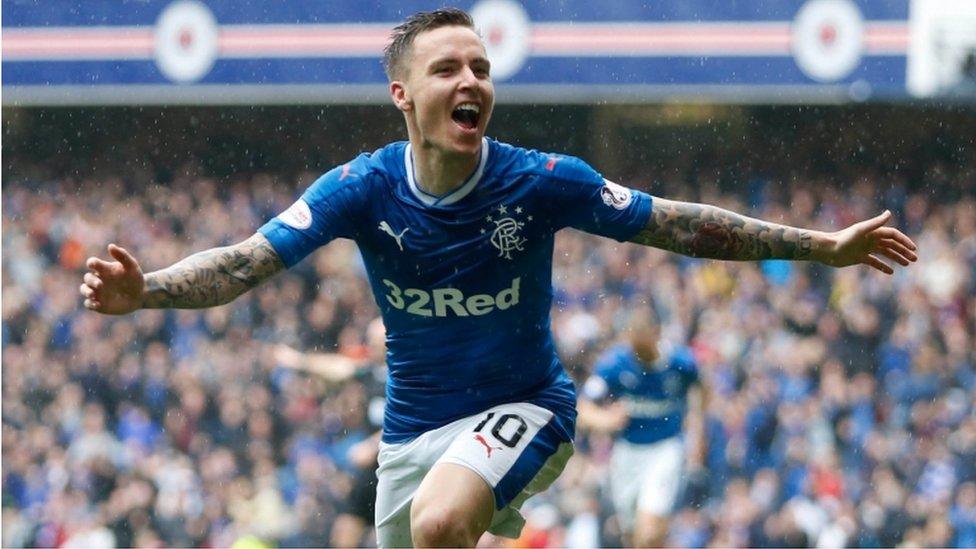
Rangers are back in the top flight of Scottish football after working their way up through the leagues
The Glasgow Old Firm - Rangers and Celtic - have won more than 100 Scottish league titles between them, dominating the top flight of Scottish football for many generations.
Both clubs have massive support and records of success that extend far beyond the domestic game.
Rangers have won 54 top flight Scottish league titles and the final three came in the years preceding the takeover by Craig Whyte.
Coin flip
Despite them being reigning champions, Craig Whyte bought Rangers in May 2011 for just £1.
A single coin, thrown across a table, completed the deal.
However, crucially, Whyte also agreed to take on Rangers' financial obligations, which included an £18m bank debt, a £2.8m "small tax case" bill, £1.7m for stadium repairs, £5m for players and £5m in working capital.
Whyte, who was 40 at the time, sought to convince those selling the club that he had the money to back up his promises, but the truth was he personally didn't have more than a tiny fraction of it.
Before the takeover was agreed, one key player wanted to be reassured that it would not "turn into an almighty mess and embarrass everyone". He would be sorely disappointed.
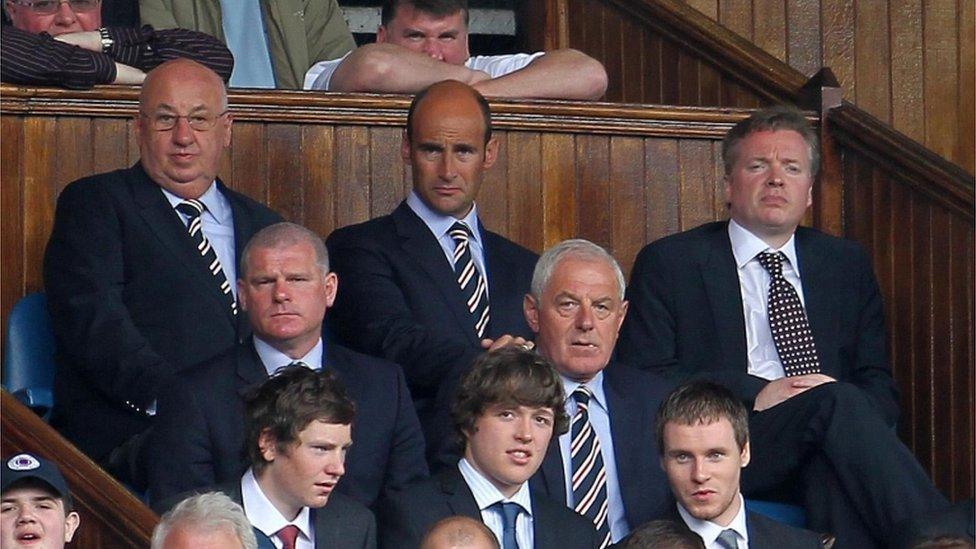
Craig Whyte (right) in the directors' box at Ibrox after he had taken over at Rangers in May 2011, with Martin Bain (back row centre) and Walter Smith (middle row right)
When Whyte arrived at Ibrox he talked a good game.
He spoke of his ambitious plans to build the club and make it stronger than ever.
But as fans soon discovered, Whyte's claims and reality were poles apart.
Dragged through the mud
In less than a year, Rangers Football Club Plc had gone bust, owing £9m in unpaid tax.
It was dragged through the legal mud - forced into administration, then into liquidation, leaving a trail of unpaid bills and tens of millions of pounds of debt.
Almost 300 creditors, large and small, were left out of pocket. Most still await payment - resigned to receiving just pennies for every pound they are owed.
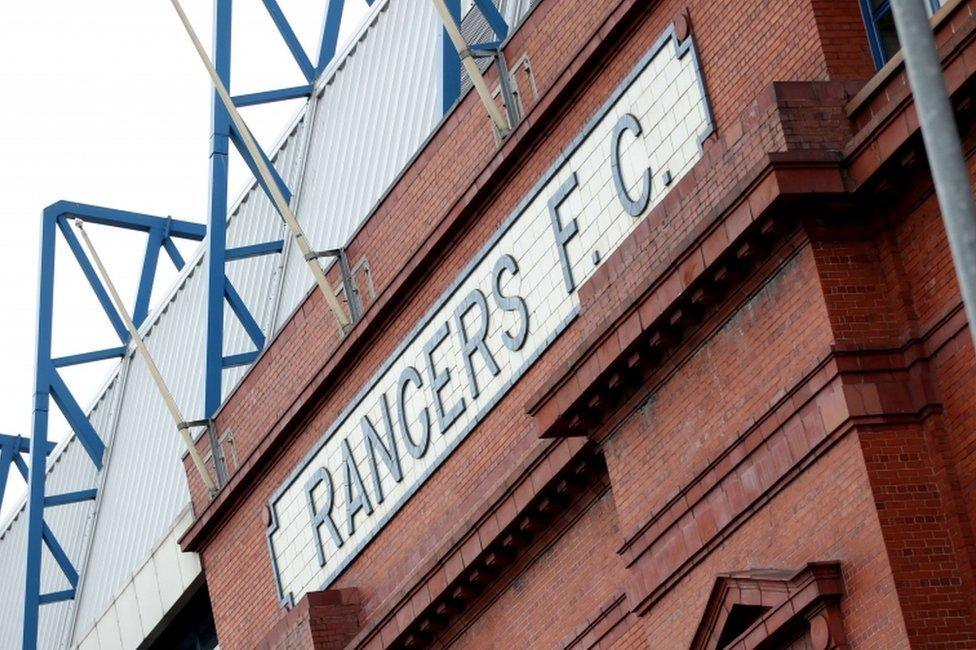
The Ibrox club started the 2012-13 season in the bottom tier of Scottish football
Rangers' assets were bought for £5.5m in June 2012 by a consortium led by former Sheffield United chief executive Charles Green.
The Ibrox club started the next season in the bottom tier of Scottish football - a giant among footballing minnows.
Their thousands of loyal fans trailed around the country to watch their team play and even lose against Stirling Albion, Peterhead and Annan Athletic.
For them, this was an abject humiliation, heaping insult on to injury.
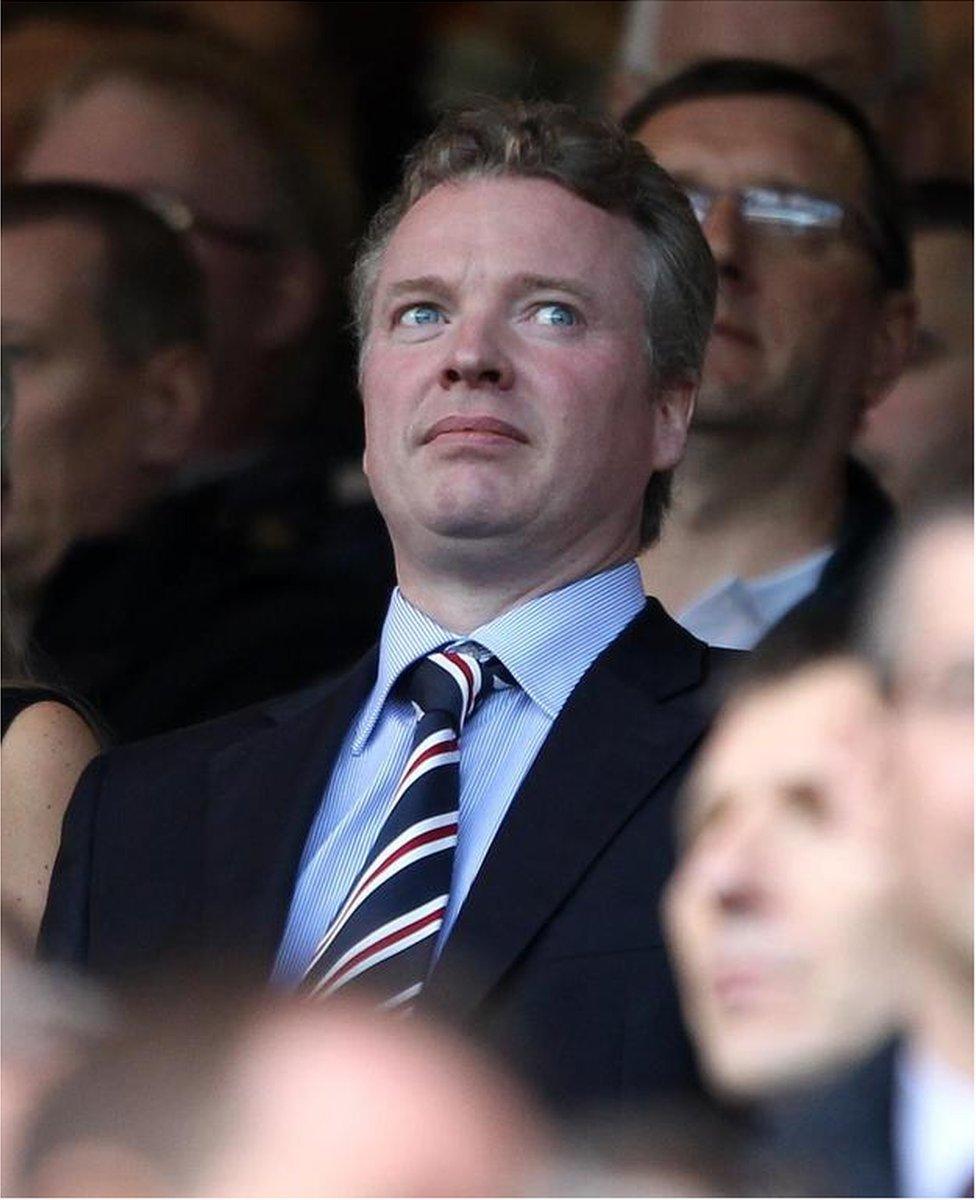
Craig Whyte during a Scottish Premier League match at Ibrox in September 2011
Before he bought Rangers, Craig Whyte seemed to have it all - a castle in the Highlands, a home in Monaco, and a reputation as a secretive billionaire who had grown rich from turning around ailing companies.
But doubts quickly emerged.
A BBC Scotland investigation uncovered serious questions about Whyte's dodgy business dealings.
He had been given a seven-year ban from acting as a company director - a serious penalty that raised big questions about his fitness to buy a publicly-listed company like Rangers.
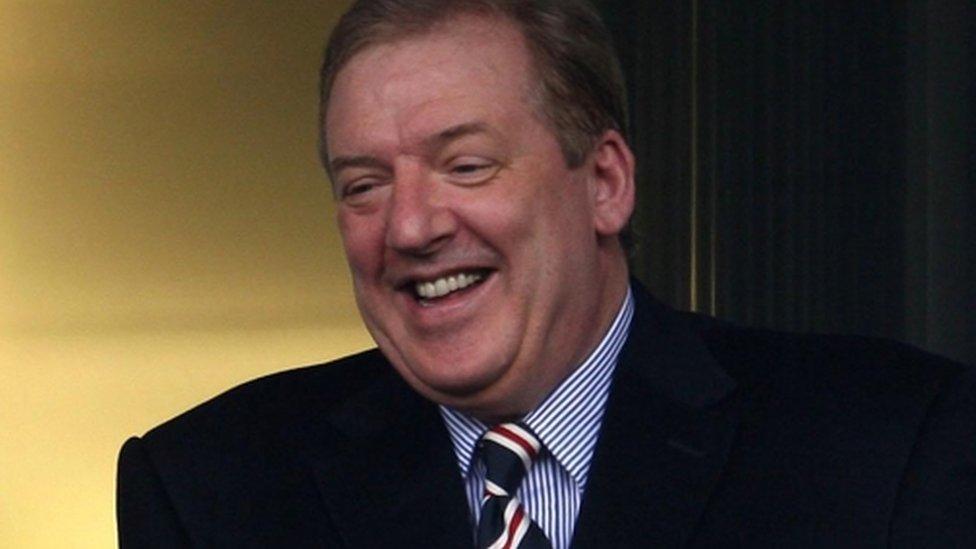
Whyte told Sir David Murray the cash coming "from his own pocket"
Through six weeks of evidence, the jury at the High Court in Glasgow learned how the Rangers deal was put together.
Whyte claimed time and again that he would pay for Rangers with his own money - the cash coming "from his own pocket" as he apparently told the club's then owner, Sir David Murray.
Alongside Whyte's assertions were statements from trusted advisers, "proof of funds" and "letters of comfort" that he had the money - £33m - to buy the club.
Mortgaging Rangers assets
His assertions were aimed at anyone who mattered, Sir David Murray, his team of advisers and key figures at Rangers.
The jury heard the cash to settle the debt had actually been raised through a complex deal, engineered by Whyte.
Months before he acquired Rangers, Whyte agreed to sell three years of Rangers season tickets to the London ticketing firm Ticketus.
This would provide the bulk of the funds - more than £24m - once Whyte had bought the club.
In effect, Whyte was mortgaging Rangers' assets before he owned them.
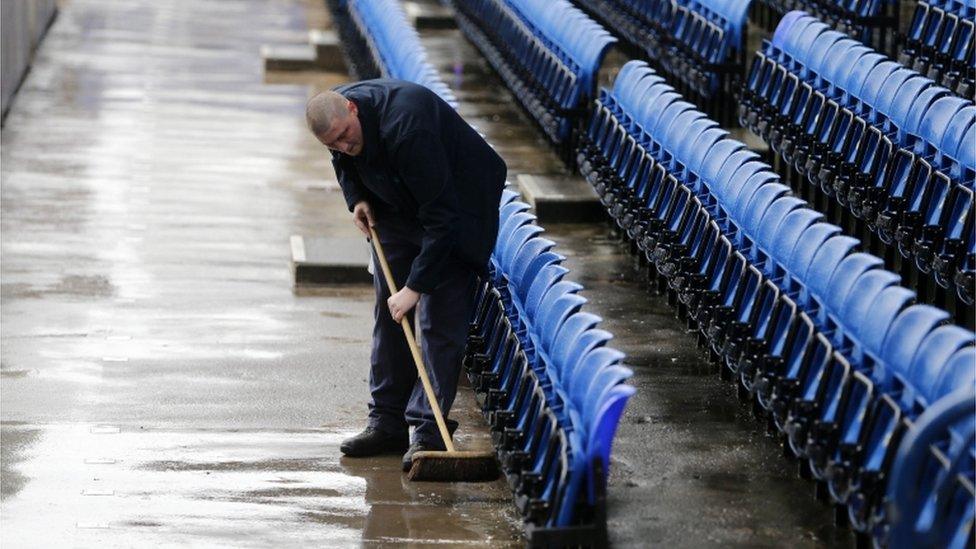
Whyte agreed to sell the revenue from Rangers' season ticket receipts before he owned the club
When Whyte bought Rangers, the club was embroiled in two major disputes with Her Majesty's Revenue and Customs.
Known as "the wee tax case" and "the big tax case" they both involved allegations that Rangers had avoided paying millions of pounds in tax that were due.
The trial heard that Craig Whyte agreed to pay out almost £3m to settle the "wee tax case", after he took over at Ibrox, in return for the sale price being reduced.
The "big tax case" was on a different scale altogether.
This dispute focused on Rangers' use of EBTs or Employee Benefit Trusts, used to pay players and senior club officials from 2001-2009.
The scheme involved Jersey-based trusts offering tax-free loans.
The tax authorities refused to accept they were legal, and demanded almost £50m.
A long drawn out legal battle followed.
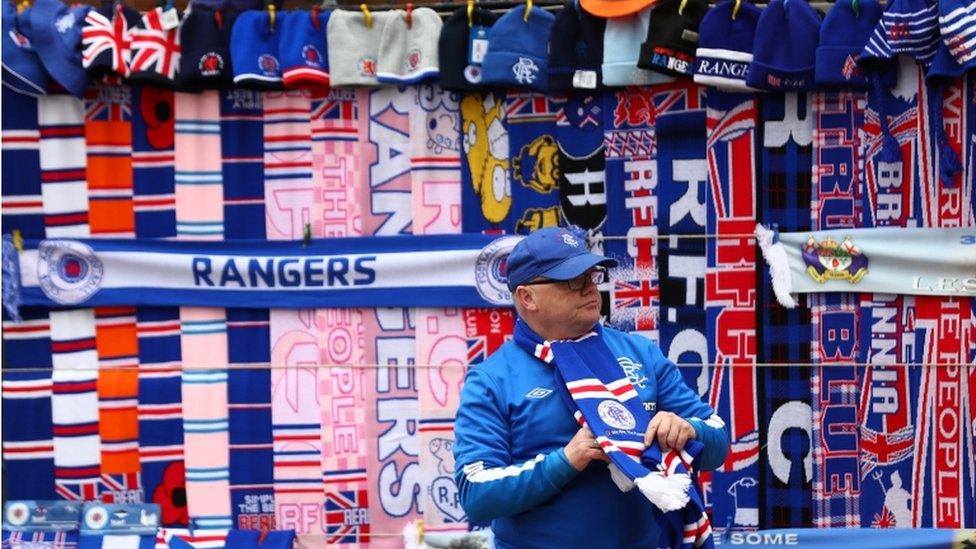
It was clear to Rangers, the Murray group and to Craig Whyte, that if HMRC won this tax dispute, Rangers could be forced into administration.
There was not the money to pay the bill.
Years on, the dispute has still to be resolved, and we await a judgement from the UK Supreme Court.
Pushed ahead
In 2011, as the deadline for the Whyte deal approached, his lawyer Gary Withey had misgivings, telling Whyte he would be "mad" to buy the club, and that he should walk away.
Whyte apparently laughed - and pushed ahead with the takeover anyway.
Withey's law firm, Collyer Bristow, would later pay out £24m to Rangers' liquidators, a dismal price for its role in the deal.
Craig Whyte persuaded the Rangers owner Sir David Murray to sell him the club.
But throughout the trial, the defence team highlighted the Murray Group's apparent lack of interest in how Whyte was funding the deal.
It emerged Sir David had paid nothing to investigate Whyte's background.
He said Whyte was advised by a reputable firm of lawyers and financial advisers and he was entitled to assume that he was a person of good standing.
Whyte's lawyers argued: How could Murray NOT have known that Ticketus were funding the deal? How could this have been a case of fraud if the apparent victims were so passive, so apparently careless about where Whyte's money was coming from?
Triple-whammy for Murray
The court also learned that the deal came at a good time for the Murray group, which had been hammered by the financial crisis.
In 2010, Sir David's business empire was in dire straits financially - "technically insolvent", as one former director put it.
Sir David told the court that his steel and property empire had been hit by a triple-whammy amid the credit crunch, with the near-simultaneous collapse of the world steel market, commercial property market, and the Bank of Scotland.
As Sir David ruefully put it, he could have coped with one or two of these events, but three was a real challenge.
It emerged that Murray's bank, Lloyds Banking Group, brought intense pressure to bear on the reluctant Rangers board to back the deal with Craig Whyte.
But the court also learned the bank had dangled a carrot under Sir David's nose.
The bank would allow him to take back control of a key company, Murray Metals, once Rangers was sold to Whyte.
Was this an incentive, as the defence team claimed? Yes, admitted a senior figure from the bank.
Was this the reason, the defence claimed, for Murray's lack of curiosity about the source of Craig Whyte's funds? Murray and his team denied that.
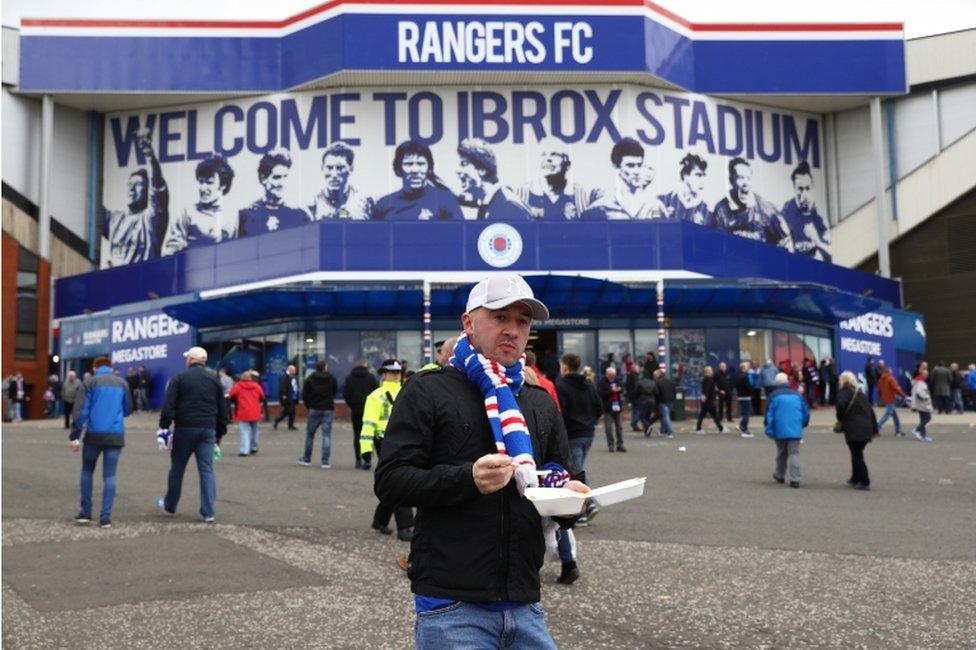
It became clear, though, that Whyte did his best to hide the role of Ticketus before the deal.
The trial heard claims that Whyte issued strict instructions to his lawyers not to admit that Ticketus was involved.
Time and again, Sir David and his team told the jury they would never have sold the club to Whyte if they had known he was being bankrolled by Ticketus.
The court heard how prior deals to sell the Ibrox club had collapsed at the last moment because Sir David did not like what would-be buyers planned to do.
Several witnesses talked of Sir David's deep affection for the club he had owned for 23 years - and how this rugged businessman allowed his heart to rule his head when it came to the Ibrox club.
This was no "fire-sale", Murray claimed. He said he was in no tearing hurry to sell.
Sir David claimed he was simply blindsided by Whyte's strategy and by the scale of his deception.
Third-party funds
The deal that passed ownership of the majority stake in Rangers from Murray to Whyte was written in a share purchase agreement, or SPA.
Time and again the jury was asked to focus on the wording of the document.
Why, asked the defence, did it allow for Rangers to be bought using "third party funds" if Whyte was funding the deal from his own pocket?
Was that the legal equivalent of a nudge and a wink, leaving the door open for Ticketus funds to be used?
But the prosecution countered with its own barrage of questions: Why did Whyte think he could go to Ticketus after the deal was signed, asking them to release £24m, even though the contract clearly required him to have funds immediately available? How could he claim he was acting in the spirit of that agreement?
This short contract, intended to set out clearly the fate of Rangers, seemed to fail the simple test of clarity.
Unspoken star
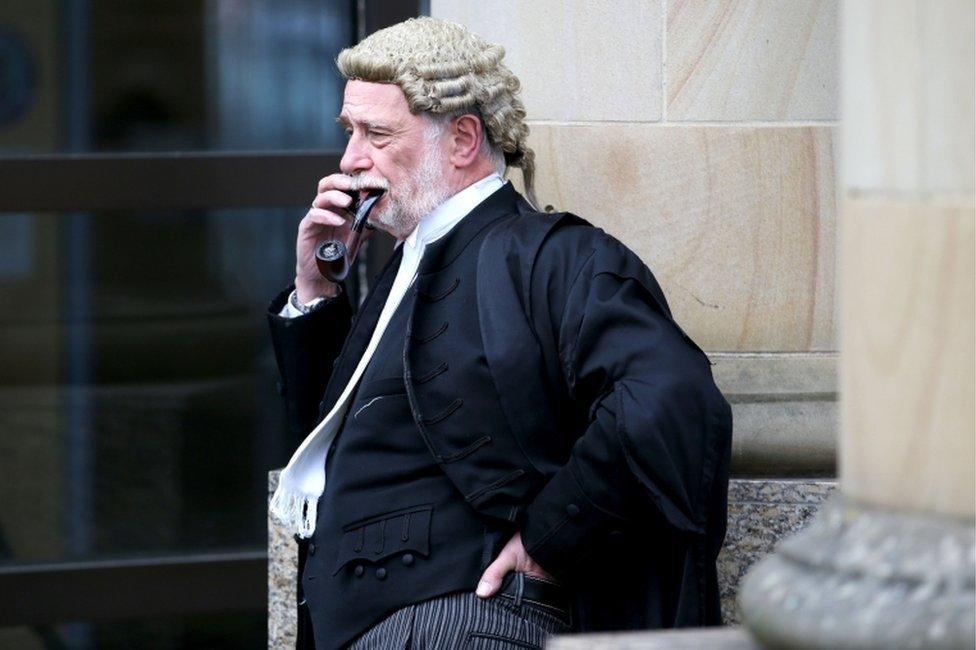
Donald Findlay QC is a former Rangers vice-chairman
At the heart of most court cases is a simple human drama.
The cast of characters in this trial was straight out of central casting.
But, as so often, the unspoken star of the show was the defence QC, Donald Findlay.
What's odd is that his relationship with Rangers goes back a long way.
He was the Rangers vice-chairman during the club's glory years, but was forced to stand down after being filmed at a gathering of Rangers fans, singing the sectarian song "The Sash".
Among those he cross-examined with his usual skill was Sir David Murray - his boss all those years ago.
Only once did he hint at his links with Rangers, when he asked his former boss: "Sir David, what did they do to OUR club?"
And yet he defended the man accused of bringing down Rangers.
Some may see this trial as Findlay's finest hour.
Salvo of litigation
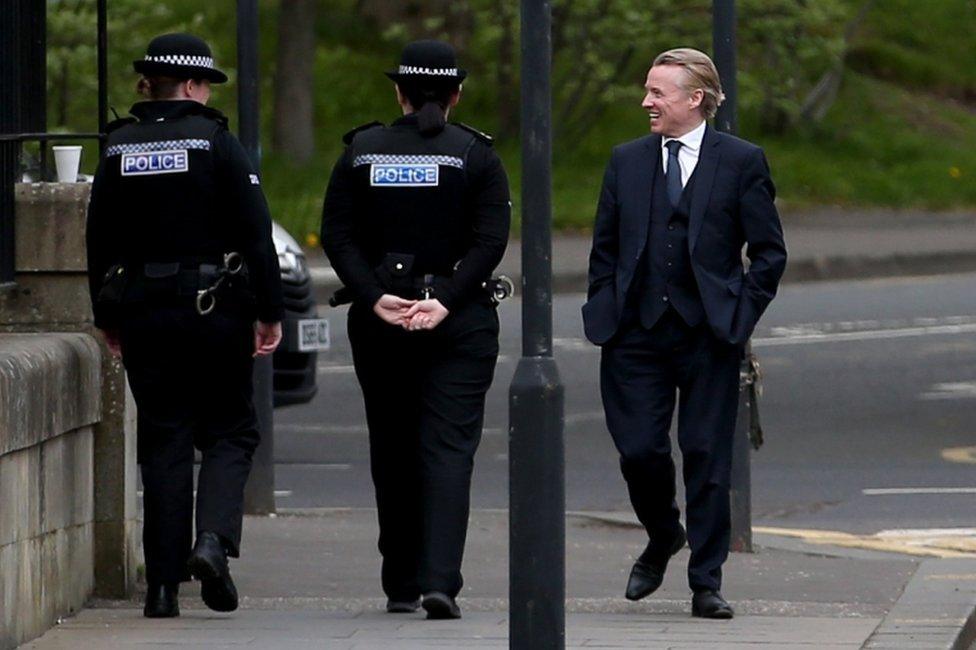
Craig Whyte arrives at the High Court in Glasgow with a greeting for the police
In the years that followed the collapse of Rangers, Craig Whyte has faced a barrage of legal action.
At one point he left the country. Eventually, he was tracked down to Mexico, held by police, and returned to the UK.
That salvo of litigation forced this apparent millionaire into bankruptcy. He was banned, yet again, from being a company director, this time for 15 years.
Six years on, Rangers are still on the mend, recovering slowly from the devastating chain of events that followed Craig Whyte's takeover.
No-one would claim his takeover was anything other than a failure but after years of accusations and a criminal trial, he can at last say it was not fraud.